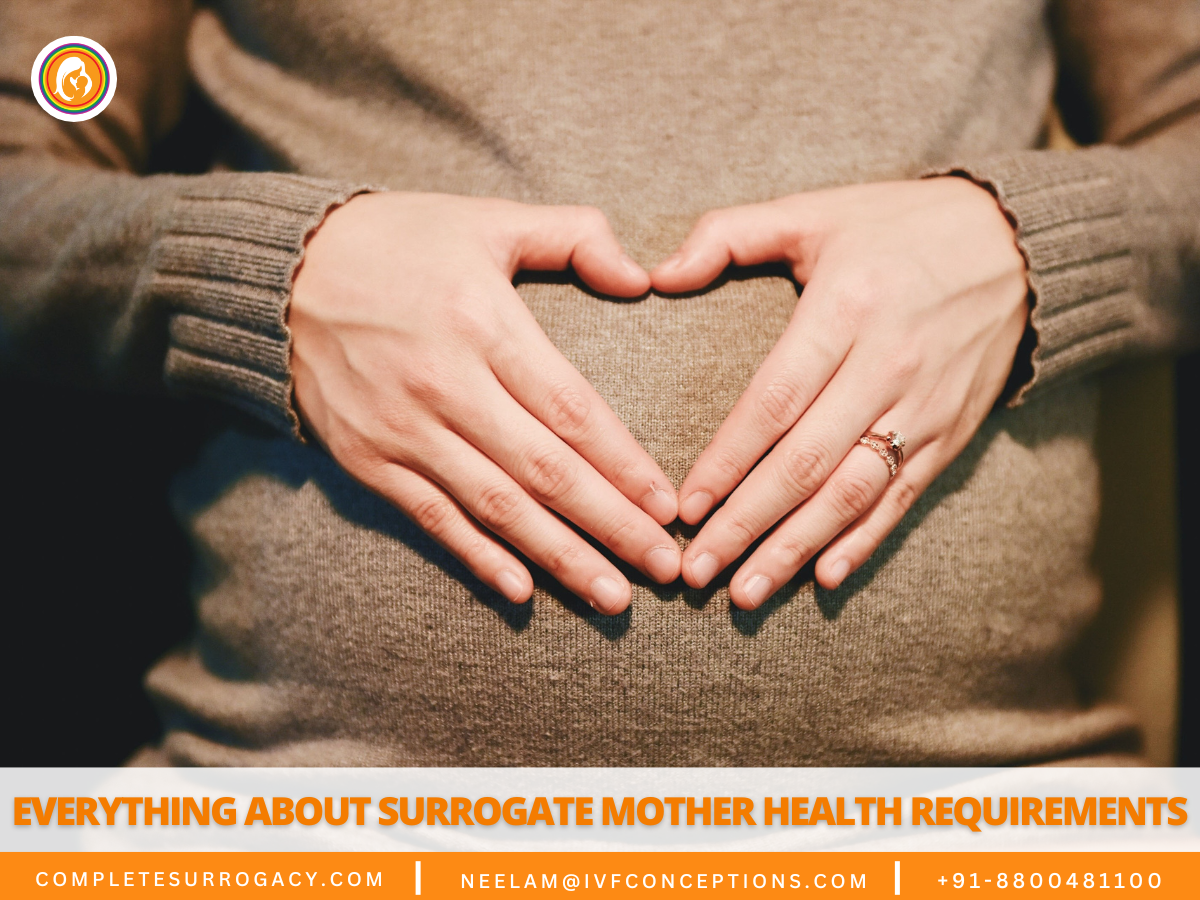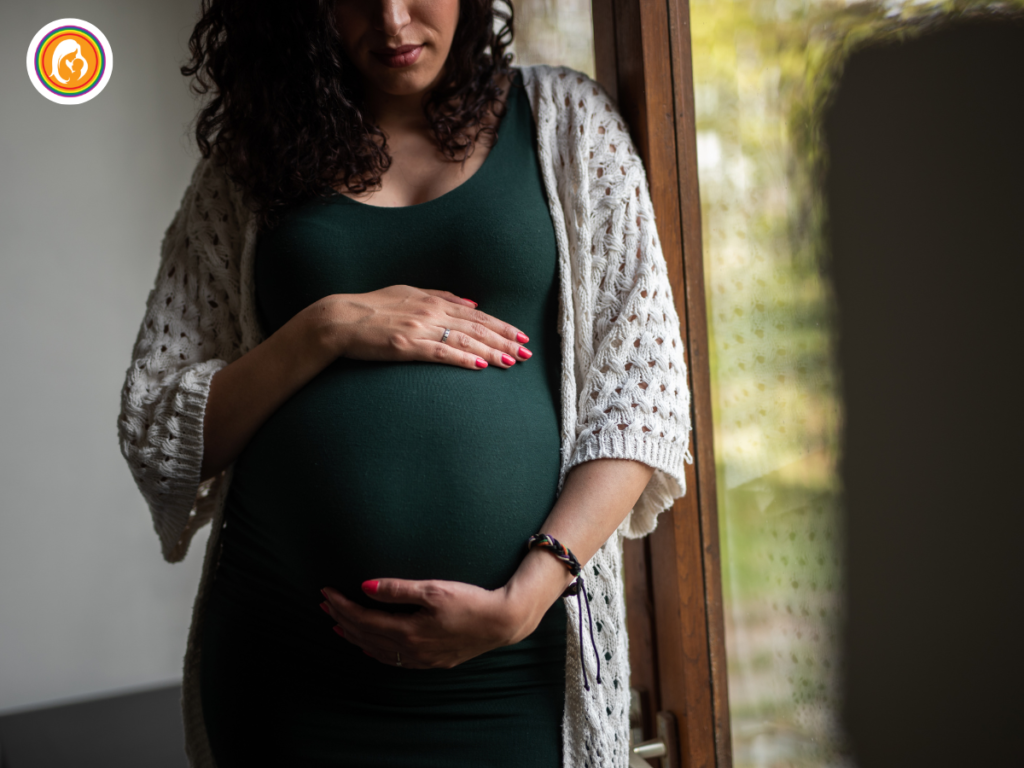Everything About Surrogate Mother Health Requirements

Surrogate mothers play a crucial role in helping childless intended parents fulfill their dreams of having a family. This selfless act requires significant lifestyle adjustments and adherence to strict health guidelines to ensure the safety and well-being of both the surrogate and the baby. Understanding the health requirements for surrogate mothers is essential for a successful pregnancy.
- Book an online appointment: Get a free online consultation.
- Call\W:+91-8800481100 Email:neelam@ivfconceptions.com
In this guide, we’ll explore everything about surrogate mother health requirements, from medical screenings to lifestyle modifications. Ensuring the health and well-being of surrogate mothers is a top priority to guarantee a healthy pregnancy and a positive outcome for all parties involved.
In this guide, we’ll cover everything you need to know about the health requirements for surrogate mothers, providing a definitive resource for intended parents and prospective surrogates alike.
More Resources to Read:
Surrogacy Guide for Surrogate Mothers
Surrogacy Guide for Intended Parents
How does the surrogacy process work
Pre-Surrogacy Screening Process
Before a woman can become a surrogate, she must undergo a series of rigorous screenings to ensure she is physically, mentally, and emotionally prepared for the surrogacy journey. These screenings help confirm that the surrogate is capable of carrying a pregnancy to term safely and healthily.

1. Initial Application
The surrogacy process begins with an initial application where the prospective surrogate provides detailed information about her motivation for becoming a surrogate, medical history, and family background. This application helps agencies assess whether the candidate meets the basic criteria for surrogacy.
2. Background Screening
A thorough background check is conducted to ensure that the surrogate does not have any criminal record or financial instability. This step is crucial for building trust between the surrogate and the intended parents, ensuring that the surrogate is a reliable and responsible individual.
3. Medical Screening
Medical screening is one of the most critical aspects of the surrogacy process. It includes:
- Reproductive Assessment: Evaluates the health of the surrogate’s uterus and overall reproductive system.
- Blood and Urine Tests: These tests check for infectious diseases, hormone levels, and other health markers to ensure the surrogate is physically fit for pregnancy.
- Pelvic Exam and Ultrasound: These procedures assess the condition of the uterus and ovaries, ensuring there are no underlying issues that could affect pregnancy.
4. Psychological Screening
The emotional well-being of the surrogate is just as important as her physical health. A psychological screening, often conducted by a social worker or mental health professional, evaluates the surrogate’s mental and emotional stability. This assessment ensures that the surrogate is emotionally prepared for the surrogacy journey and can handle the psychological demands of carrying a child for someone else.
Health and Lifestyle Requirements for surrogate mothers
Once a surrogate has passed the initial screenings, she must adhere to certain health and lifestyle guidelines throughout the pregnancy to ensure the best outcomes for both her and the baby.

1. Age Requirements
- Ideal Age Range: 21 to 40 years old.
- Why Age Matters: As women age, their fertility and ability to carry a pregnancy can decline, increasing the risks associated with pregnancy. Most agencies set age limits to ensure the surrogate has the best chance of a healthy pregnancy.
2. Previous Pregnancy Requirement
A woman must have had at least one previous successful pregnancy to qualify as a surrogate. This requirement ensures that the surrogate understands the physical and emotional demands of pregnancy and has a proven ability to carry a pregnancy to term.
3. Lifestyle Adjustments
Surrogates are expected to make significant lifestyle adjustments during the surrogacy process, including:
- Abstaining from Smoking and Alcohol: These substances can harm the developing baby and are strictly prohibited.
- Following a Healthy Diet and Exercise Regimen: Maintaining good physical health is crucial for a successful pregnancy.
- Avoiding High-Risk Activities: Activities that could lead to injury or stress are discouraged.
More Resources to Read:
Infertility Treatment and Surrogacy Process
9 Factors To Improve IVF Pregnancy Rate
International Surrogacy Options Worldwide
Surrogacy Guide for Surrogate Mothers
Conclusion: Meeting the Surrogate Mother Health Requirements
Becoming a surrogate is a noble and life-changing decision, but it comes with strict health requirements to ensure the safety and success of the pregnancy. These requirements, established by surrogacy agencies and fertility doctors, are designed to protect all parties involved—especially the surrogate and the baby. If you’re considering becoming a surrogate, it’s essential to understand and meet these health requirements fully.
For more information on surrogacy, IVF, or egg donation, visit IVF Conceptions. We provide free, legally secure, and affordable surrogacy consulting services to help you make informed decisions on your surrogacy journey.
Get in touch with us today to explore your surrogacy options worldwide!
If you’d like to learn more about IVF, Egg Donation, or surrogacy services globally, check out the rest of our website at Complete Surrogacy Agency. We offer legally secure and affordable surrogacy consulting services for FREE.
Complete Surrogacy: Your Trusted Partner in International Surrogacy
At Complete Surrogacy, we have over 15 years of experience in international surrogacy, guiding 4,000+ intended parents worldwide. We provide safe, ethical, and affordable surrogacy solutions for single parents, LGBTQ+ couples, and heterosexual couples.
As members of EFS and ESHRE, we adhere to the highest ethical and professional standards. Our expert team is committed to providing accurate, compassionate, and transparent guidance, ensuring a legally secure and smooth journey to parenthood.
Let us help you build your family with trust, care, and integrity.
Get in touch for one FREE Surrogacy Consultancy!

FAQs About Surrogate Mother Health Requirements
1. What are the age requirements for becoming a surrogate mother?
The ideal age range for surrogates is typically 21 to 40 years old. This range helps ensure that the surrogate is physically capable of handling the demands of pregnancy and reduces the risk of complications.
2. Why is it necessary for a surrogate to have had at least one previous successful pregnancy?
Having had at least one previous successful pregnancy confirms that the surrogate has a proven ability to carry a pregnancy to term and gives reassurance that her body can handle the demands of carrying another child.
3. Can a surrogate mother be a smoker or consume alcohol?
No, surrogate mothers are required to abstain from smoking and alcohol during the surrogacy process. These substances can negatively impact the health of the baby and the pregnancy.
4. Are there any lifestyle changes required for a surrogate mother?
Yes, surrogates must maintain a healthy lifestyle, including following a balanced diet, regular exercise, and avoiding high-risk activities. These measures help ensure the health and safety of both the surrogate and the baby.
5. Can a woman with a history of medical conditions like diabetes or PCOS be a surrogate?
- Diabetes: Women with diabetes are generally disqualified due to the increased health risks associated with managing the condition during pregnancy.
- PCOS: Women with Polycystic Ovary Syndrome (PCOS) may be eligible, but they may face challenges related to fertility and pregnancy complications that need to be carefully managed.
6. Is it possible to become a surrogate if I have had a previous C-section?
Yes, having had a previous C-section does not automatically disqualify a woman from being a surrogate. However, a thorough medical evaluation is necessary to assess any risks associated with future pregnancies.
7. Can a surrogate mother be breastfeeding during the surrogacy process?
Surrogates are typically required to stop breastfeeding before starting the surrogacy process. Breastfeeding can delay the return of fertility and potentially complicate the surrogacy process.
8. What psychological support is available for surrogate mothers?
Psychological support is crucial for surrogates, given the emotional and mental demands of the process. Many surrogacy programs offer counseling and mental health support to help surrogates manage the emotional aspects of carrying a child for someone else.
9. Are there any specific health risks associated with surrogacy?
Yes, there are health risks such as gestational diabetes, pre-eclampsia, and emotional stress. Surrogates should be closely monitored by healthcare professionals to manage these risks and ensure a healthy pregnancy.
10. How can I find a reputable surrogacy agency?
Research and choose a reputable surrogacy agency that offers comprehensive support and adheres to stringent health and legal standards. Look for agencies with positive reviews, experienced staff, and transparent practices.

Author Bio: Neelam Chhagani is an International Surrogacy Expert with 15 years of experience in the fertility and surrogacy domain. As the founder of IVF Conceptions and Complete Surrogacy, she has guided over 4,000 intended parents worldwide on their surrogacy journey to parenthood. Recognized as a trusted authority, she specializes in holistic infertility solutions and third-party reproduction consulting.
Holding an MA in Counselling Psychology and a PGD in Mental Health, Neelam is a proud member of the European Fertility Society (EFS) and the European Society of Human Reproduction and Embryology (ESHRE). She is also a leading surrogacy blogger, providing valuable insights into ethical and practical surrogacy solutions.
Since 2010, committed to supporting ALL family types, Neelam has been passionate about helping intended parents grow their families with compassion, integrity, and a focus on secure and affordable surrogacy options Globally.
Learn more about Neelam:
https://www.ivfconceptions.com/neelam-chhagani-surrogacy-consultant/
https://www.linkedin.com/in/neelam-chhagani-92892229/















I was introduced to Neelam by a friend who worked with Neelam for surrogacy. Neelam is absolutely wonderful. I am a single male and the journey to fatherhood is not that easy. Neelam connected me to a program ideal for my circumstances. She was with me throughout the pregnancy providing advice and guidance along the way. I am so grateful I found her and am thrilled today that I have a beautiful daughter. I highly recommend Neelam to anyone who is on a journey to become a parent. Having a child has changed my world for the better. I wish others success with their own journey and recommend you connect with Neelam to find a path that is best for you.
SA (USA)